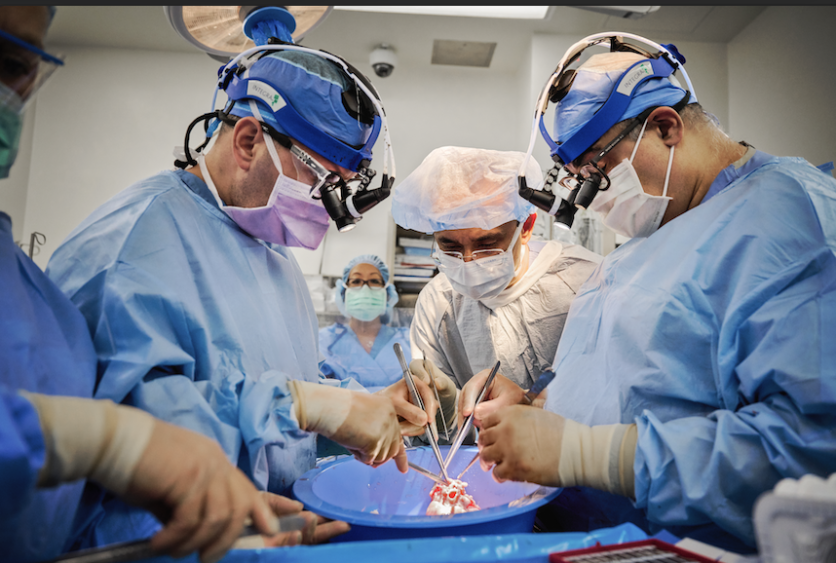A woman who received a kidney from a gene-edited pig is back on dialysis just 47 days after the surgery as doctors had to remove the gradually failing organ.
According to NYU Langone Health, Lisa Pisano, the second person to receive a genetically modified pig kidney transplant, is stable after the kidney was removed earlier this week. Doctors implanted a mechanical pump to keep her heart pumping and the pig kidney in April when her heart and kidneys were failing.
She was the first person to receive a transplanted organ and a heart pump together. Initial signs showed Pisano recuperating. However, transplant leader Dr. Robert Montgomery acknowledged the "unique challenges" in managing both the heart pump and kidney.
Her blood pressure reportedly dropped too low many times, decreasing blood flow to the kidney. In a statement released on Friday, Montgomery said that her kidney function worsened to the point that physicians could no longer justify her immune-suppressing drugs.
He noted that a recent kidney biopsy indicated no rejection, the main worry in experimental animal-to-human transplants, but they detected "significant injury" from limited blood supply. NYU said it will further study the removed kidney to learn more about how it reacted in a living individual.

Doctors Praised the Woman Involved in Xenotransplantation For Her Bravery
Montgomery noted that Pisano's heart problems prevented a traditional kidney transplant and that she did not qualify for the heart pump while on dialysis.
But he commended the patient's courage and strength amid the challenges that inspired them to pursue the "hope and promise of xenotransplantation," or the transfer of organs from one species to another.
"We are hoping to get Lisa back home to her family soon," the doctor said.
Lisa Pisano was the second person to receive a kidney from a gene-edited pig, and NYU Langone Health announced that she is stable after an operation to remove the organ earlier this week. https://t.co/B4EOML0H2o
— KFOX14 News (@KFOX14) May 31, 2024
In April, Pisano told the Associated Press that she decided to try the pig kidney transplant even though she knew it might not work. Many of the 100,000 patients on the US transplant waiting list need kidneys, and thousands have already died while waiting.
Some biotech businesses genetically engineer pigs to make their organs more human-like and immune-friendly to address the shortage of donated organs. Formal organ studies are expected to begin next year. NYU and other researchers placed pig kidneys and hearts in brain-dead corpses, with promising outcomes.
In May, Massachusetts General Hospital announced that the first genetically modified pig kidney transplant recipient, Richard Slayman, died two months after his groundbreaking xenotransplantation.
Doctors said the pig kidney transplant has nothing to do with the death of the 62-year-old man from Weymouth, who suffered from Type 2 hypertension and diabetes for years that affected his kidney.
Slayman's family noted that the pig kidney transplant gave hundreds of transplant patients hope and will continue to inspire them.
Update on the Patient Who Received Pig Liver Transplant in China
In a separate update, the 71-year-old man in China who received a genetically engineered pig liver transplant is "doing very well" two weeks after the procedure. Sun Beicheng, the surgeon at the First Affiliated Hospital of Anhui Medical University, who performed the surgery, made the announcement.
Experts are enthusiastic about the transplant's success despite its lack of widespread disclosure. "It is very exciting news," said Indiana University School of Medicine transplant specialist Burcin Ekser, according to Nature.
This transplant has helped researchers determine the viability of xenotransplantation. The xenotransplantation of livers has surged this year. Last January, a US team put a genetically modified pig liver outside the body of a dead person.
In March, Kefeng Dou, a transplant surgeon at Xijing Hospital of the Air Force Medical University in Xi'an, and his colleagues transplanted a genome-edited pig liver into a clinically dead patient for 10 days with no signs of rejection.
Last month, another Chinese team implanted a pig kidney and liver into a clinically deceased patient.





